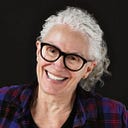How do we know when we know?
When I was a teenager, I had a long conversation with my friend Karl about the feelings we experienced when we finally understood something. He reported feeling a sense of satisfaction — like all was right in the world. I described experiencing “eureka moments” when all of the parts of an idea or process seemed to fall into place in a way that made total sense. When I was a child, I’d literally run around shouting, “I’ve got it! I’ve got it!” This behavior was discouraged by my parents and some of my friends and teachers who saw it as bragging. But I was just celebrating. It felt so GOOD to understand. Truth to tell, I still celebrate out loud in eureka moments and even encourage others to do the same—for their mental health.
I didn’t realize until middle age that feelings like mine and Karl’s were not universal—at least not for the people I was interviewing for my doctoral research (on conceptions of good education). In these interviews, I often asked the question, “What does it feel like when you understand?” To my initial surprise, many of my respondents just stared blankly in response. Follow-up questions revealed that they genuinely did not know what I was talking about.
Since completing my doctoral research I’ve had many opportunities to ask questions like, “What does it feel like when you understand?” Or, “How do you know when you know?” Over time, I’ve learned that the answers to these questions generally depend on what knowing means to the speaker.
Three ways of knowing and their implications for knowing when we know
Knowing as correctness
When knowing is about correctness, knowing means being able to remember something accurately. When knowing is about accuracy, the only way to know when we know is to compare our knowledge with the knowledge of reputable outside sources.
Knowing as understanding
When knowing is about understanding, knowing means understanding the meaning of a concept or the purpose of a process well enough to explain it accurately. When knowing involves understanding there are two ways of determining whether or not we really know—by asking ourselves if our explanations make sense to us and by asking others if our explanations make sense to them.
Knowing as embodiment
When knowing is about embodiment, knowing something means understanding it well enough to put it to work skillfully. When knowing involves embodiment, we can not only ask if our explanations make sense to ourselves and others, but we can also evaluate our applications of knowledge in terms of real-world outcomes. Moreover, because practice is by definition, embodied, our senses and emotions tend to become involved. Through practice we come to feel when we’ve arrived at a solution that makes more sense than others. We literally sense when “everything falls into place.” The feeling can range from a sense of satisfaction to a kind of ecstasy. Perhaps even more importantly, we feel uncomfortable when things don’t fall into place, and this sense of discomfort is often the first or only clue that we may not know what we think we know.
Knowing when we don’t know
As an employer, it’s important to me that my employees know when they know, but it’s even more important that they know when they don’t know. This is because knowing when we don’t know is the first step toward asking for clarification, which is often essential for avoiding costly errors. Consequently, I prefer working with people who have access to all three ways of knowing—and a wide range of skills for figuring out when they know.
Most educational institutions and curricula support knowing as correctness or understanding. At Lectica (the nonprofit that owns me) we’ve developed a learning method called micro-VCoLing that’s designed to support knowing as embodiment. It fosters the kind of learning that develops a richly integrated connectome—the kind of mind that’s best equipped for success in our complex and changing world.
